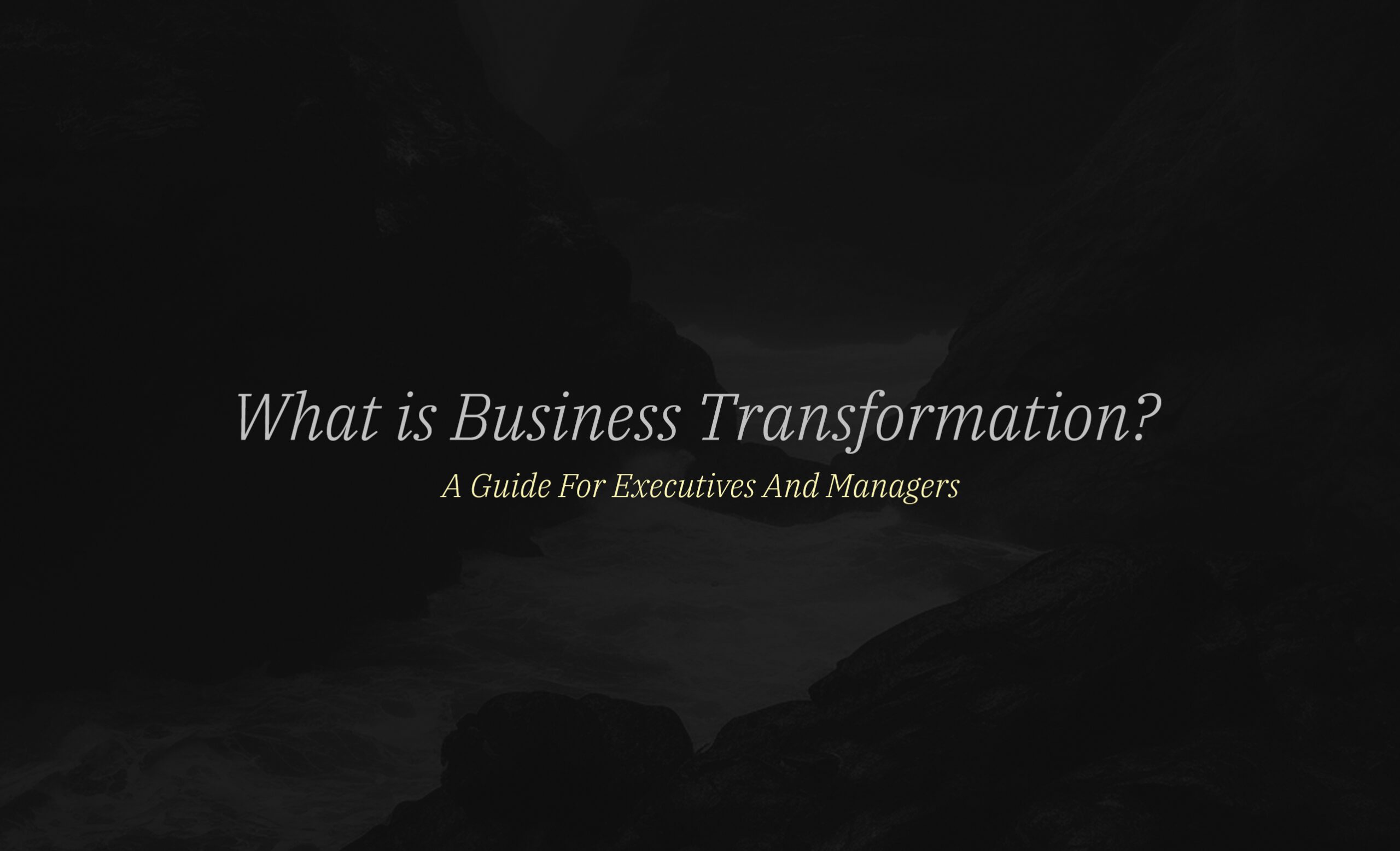In a rapidly changing world, companies must embrace change and innovation to survive and thrive. Business transformation has become a crucial aspect of modern business management as organizations look to adapt to the evolving landscape. This comprehensive guide will provide you with an in-depth understanding of business transformation, its importance, and the factors that drive it. We will explore expert opinions, statistics, data, and best practices to help executives navigate the challenges and opportunities of business transformation.
Table of Contents
- Defining Business Transformation
- The Importance of Business Transformation
- Drivers of Business Transformation
- Components of Successful Business Transformation
- Expert Opinions on Business Transformation
- Business Transformation Case Studies
- Key Challenges and How to Overcome Them
- Business Transformation Frameworks and Methodologies
- Measuring the Success of Business Transformation Initiatives
- Conclusion
Defining Business Transformation
Business transformation is a holistic approach to change management that involves redefining an organization's strategic direction, operational processes, technology, and culture to stay competitive and achieve better business outcomes. This process may involve organizational restructuring, adopting new technologies, or revamping business models to meet emerging customer needs and market trends.
The Importance of Business Transformation
The World Economic Forum suggests that we are in the midst of a Fourth Industrial Revolution, characterized by rapid technological advancements and increased connectivity. Businesses must continuously adapt and innovate to stay relevant in this constantly changing landscape. According to a survey by McKinsey, companies that successfully implement business transformation are 1.7 times more likely to outperform their industry peers.
Drivers of Business Transformation
Several factors drive the need for business transformation, including:
- Technological advancements: The rapid pace of technological innovation necessitates continuous adaptation and digital transformation to stay competitive.
- Market shifts: Changes in consumer preferences, competitive landscapes, and industry dynamics require businesses to realign their strategies.
- Regulatory changes: New regulations and compliance requirements can demand significant changes in business practices.
- Economic conditions: Economic downturns or upturns may require businesses to restructure or scale operations.
- Globalization: The interconnected nature of the global economy exposes businesses to new opportunities and threats, necessitating agile responses to stay ahead.
Components of Successful Business Transformation
A successful business transformation involves several critical components:
- Clear vision and strategy: A well-defined vision and strategy provide direction and help align resources towards common goals.
- Effective leadership: Strong leadership is essential to drive change, inspire confidence, and foster a culture of innovation.
- Employee engagement: Ensuring employees understand and are invested in the transformation is crucial for success.
- Data-driven decision-making: Leveraging data and analytics can help organizations make informed decisions and track progress.
- Continuous improvement: Transformation should be an ongoing process, with organizations regularly reassessing and refining their approach.
Expert Opinions on Business Transformation
Leading experts emphasize the importance of business transformation in achieving long-term success. According to John Kotter, a renowned change management expert, organizations need to create a sense of urgency, establish a guiding coalition, and develop a strategic vision to drive successful transformation. Clayton Christensen, the father of disruptive innovation theory, highlights the need for organizations to constantly adapt and innovate to avoid being disrupted by new market entrants.
Business Transformation Case Studies
To better understand the process and impact of business transformation, let's examine some notable case studies:
- Nokia: Once a leading mobile phone manufacturer, Nokia transformed itself into a leading network infrastructure provider. This strategic shift allowed the company to survive and thrive in the face of rapidly changing market conditions.
- Netflix: Originally a DVD rental service, Netflix pivoted to become a leading streaming content provider and content creator. This transformation enabled the company to stay relevant and grow exponentially in a changing media landscape.
- Adobe: Adobe successfully transitioned from a traditional software licensing model to a subscription-based model, known as Creative Cloud. This strategic shift helped the company grow its revenue and expand its customer base.
Key Challenges and How to Overcome Them
Business transformation initiatives can be challenging, with several potential obstacles to success. Some of the key challenges include:
- Resistance to change: Employees may be resistant to change due to fear of the unknown or concerns about job security. To overcome this, engage employees early in the process, communicate the benefits of change, and provide support and training to help them adapt.
- Lack of clear vision and strategy: Without a clear vision and strategy, transformation efforts may lack direction and focus. Develop a well-defined vision and strategy to guide the transformation process and ensure alignment across the organization.
- Insufficient resources: Limited resources can hinder the successful execution of transformation initiatives. Prioritize initiatives based on their potential impact and allocate resources accordingly to maximize returns on investment.
- Inadequate leadership: Weak leadership can undermine transformation efforts. Develop strong leaders who can drive change, inspire confidence, and foster a culture of innovation.
Business Transformation Frameworks and Methodologies
Various frameworks and methodologies can guide organizations through the business transformation process, including:
- Kotter's 8-Step Process: This widely recognized framework outlines eight steps to guide organizations through the change process, from creating a sense of urgency to consolidating gains and producing more change.
- Agile Transformation: Agile methodologies focus on iterative, incremental change and can be applied to business transformation initiatives. The Scaled Agile Framework (SAFe) is a popular approach for implementing Agile principles across an organization.
- Prosci's ADKAR Model: The ADKAR model is a goal-oriented change management approach that focuses on five key elements: Awareness, Desire, Knowledge, Ability, and Reinforcement.
Measuring the Success of Business Transformation Initiatives
Measuring the success of business transformation initiatives is crucial to understanding their impact and refining future efforts. Key performance indicators (KPIs) should be established to track progress and measure success, such as:
- Financial metrics: Revenue growth, cost reduction, and return on investment can indicate the financial impact of transformation initiatives.
- Operational metrics: Improved efficiency, reduced cycle times, and increased productivity can demonstrate the effectiveness of operational changes.
- Customer metrics: Customer satisfaction, net promoter score, and customer retention can provide insights into the impact of transformation initiatives on customer relationships.
- Employee metrics: Employee engagement, retention, and satisfaction can help gauge the success of organizational and cultural changes.
Regularly monitoring and reporting on these KPIs can help organizations assess the effectiveness of their transformation efforts and identify areas for improvement.
Conclusion
Business transformation is an essential process for organizations looking to thrive in today's dynamic and ever-changing business environment. By understanding the importance of business transformation, the factors that drive it, and the components of successful transformation, executives can better navigate the challenges and opportunities that lie ahead.
To stay competitive and ensure long-term success, organizations must embrace change, continually reassess their strategies, and invest in technology and human capital. As global markets and industries evolve, businesses that fail to transform risk being left behind.
In this comprehensive guide, we've explored expert opinions, case studies, challenges, frameworks, methodologies, and measurement strategies to provide a well-rounded understanding of business transformation. As an executive, leveraging this knowledge will help you lead your organization through the transformation process, ensuring it remains agile, innovative, and competitive in an ever-evolving world.
Additional Resources for Executives
To further enhance your understanding of business transformation and stay updated on the latest trends and best practices, consider the following resources:
- Books:
- Leading Change by John P. Kotter: This seminal book on change management offers invaluable insights on how to successfully navigate organizational change.
- The Innovator's Dilemma by Clayton M. Christensen: This groundbreaking work discusses the challenges established companies face in dealing with disruptive innovations.
- Digital Transformation: Survive and Thrive in an Era of Mass Extinction by Thomas M. Siebel: This book offers a comprehensive guide to understanding and implementing digital transformation in organizations.
- Online Courses and Certifications:
- Digital Transformation: From AI and IoT to Cloud, Blockchain, and Cybersecurity by the University of Colorado: This Coursera specialization covers essential aspects of digital transformation and the technologies driving it.
- Leading Transformative Change in the Digital Age by MIT Sloan: This executive education program offers a practical framework for leading transformative change in organizations.
- Conferences and Events:
- Gartner Digital Workplace Summit: This annual event offers insights on the latest trends and best practices in digital workplace transformation.
- The Forrester Digital Transformation & Innovation Forum: This forum brings together industry experts to discuss the latest strategies and technologies for driving business transformation.
By leveraging these resources, executives can continue to develop their understanding of business transformation, stay up-to-date on emerging trends, and refine their strategies for leading their organizations through the transformation process. This ongoing learning and adaptation will be essential to ensuring long-term success in an ever-changing business environment.



No comments.